On Sept. 15, RSVP AmeriCorps Seniors is hosting its 31st annual Senior Source Health & Information Fair. This fair will be open from 10 a.m. to 2:30 p.m. at the Richland Mall in Waco, TX, and will give seniors opportunities to learn about and take action for their personal health.
This year, RSVP AmeriCorps Seniors will offer multiple free health screenings to participants, alongside free flu shots and COVID-19 immunizations with I.D. and either Medicare or an insurance card. At the fair, other exhibitors will share up-to-date information for senior adults, caregivers, and the general public about their personal health.
The Health & Information Fair currently has open tables for new exhibitors. If interested in exhibiting at the fair or for general questions, contact RSVP AmeriCorps Seniors at (254) 299-8766 or visit https://americorps.gov/.
Participants at the fair are responsible for medical advice and screening administered at the event and should consult with a physician for further evaluation.
On Monday afternoon, Waco Family Medicine (WFM) hosted “Flavor Feast,” a free lunch at the Meyer Center for community members experiencing homelessness. The event included a meal provided by Part Time Chef and a cooling station for attendees.
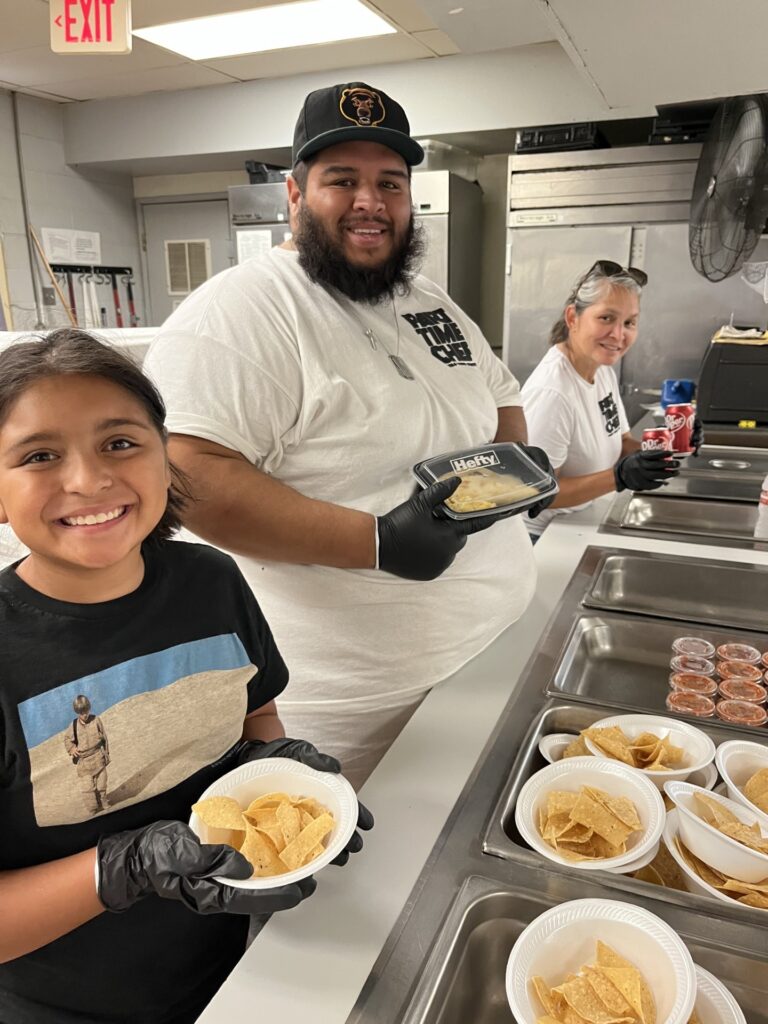
The event kicked off WFM’s recognition of National Health Center Week (NHCW). NHCW is an annual observance sponsored by the National Association of Community Health Centers (NACHC) running from Aug. 6 to 12. It aims to raise awareness and honor the contributions of Community Health Centers (CHCs) like WFM that provide comprehensive healthcare services to millions of patients across the U.S.
WFM’s NHCW programming includes People Experiencing Homelessness Day (Monday), Patient Appreciation Day (Wednesday), and Health Center Staff Appreciation Day (Friday). Patients and staff will be recognized with tokens of appreciation later in the week.
Each year for NHCW, WFM hosts Healthcare for People Experiencing Homelessness Day to highlight and expand the care provided to community members experiencing homelessness in Central Texas. People who experience homelessness endure higher rates of chronic and acute disease, behavioral health conditions, and other needs that are connected to poorer health outcomes, disability, and early death. Located downtown in the same building as Mission Waco’s Meyer Center, Waco Family Medicine – Meyer Center treats more patients experiencing homelessness than most other locations in the clinic system.
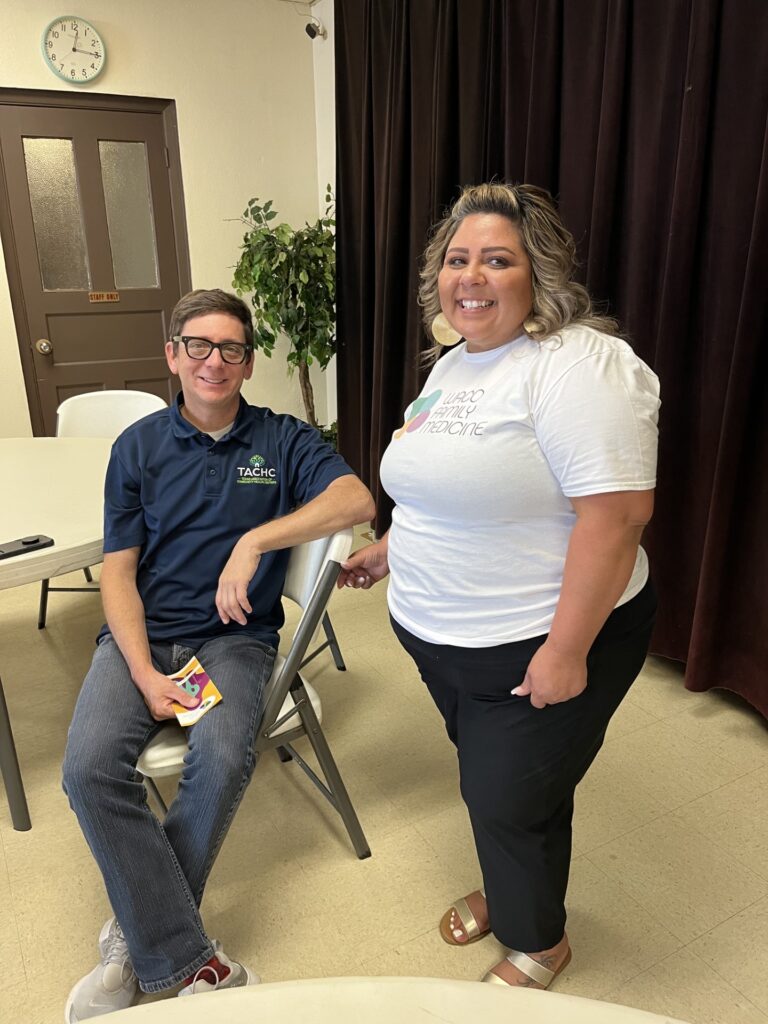
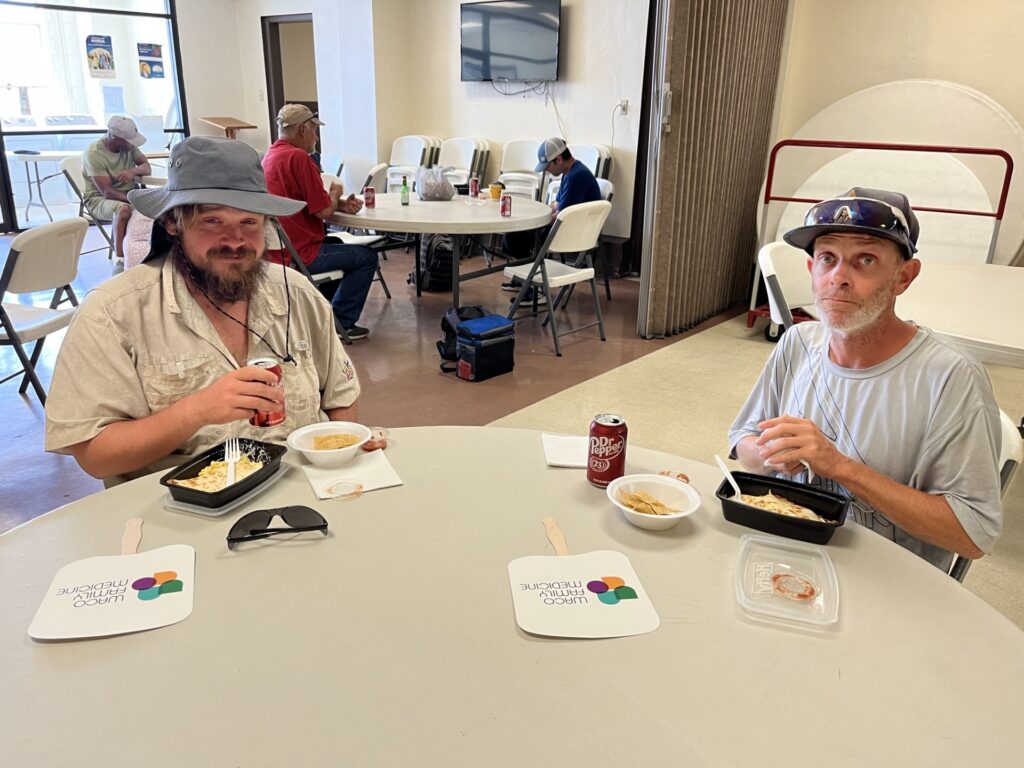
In 2022, WFM provided more than 61,000 patients with integrated medical, dental, and behavioral health care across 15 clinical sites. WFM addresses social and environmental barriers to wellness through innovative programs and community partnerships. Additionally, an in-house pharmacy provides quickly filled prescriptions to patients at a fraction of traditional costs.
With a quarter-million patient visits annually, the WFM system cares for one-fifth of McLennan County’s population. Ninety percent of county residents live within 10 miles of a WFM location, making care more accessible to patients, especially those with limited transportation. In 2021, about 74% of WFM patients identified as a racial or ethnic minority, and 22% were best served in a language other than English. The organization strives to provide high-quality, equitable care to meet the medical needs of Central Texans.
WFM invites community members, partners, and supporters to follow the organization on Facebook and Instagram (@wacofamilymedicine) to learn more about the social and economic contributions of CHCs throughout NHCW.
###
Waco Family Medicine is a Federally Qualified Health Center providing medical, dental, behavioral health, and community health care at 15 locations across McLennan and Bell counties. The nonprofit also provides graduate medical education through Waco Family Medicine – Institute and serves as a clinical training site for medical residency students, dental students, physician assistants, nurse practitioners, clinical social workers, pharmacy students, medical technicians, and allied health caregivers. WFM was established in 1970 to address a shortage of doctors, lack of access to primary healthcare, and economic development issues.
With temperatures soaring and the mercury reaching 100 degrees, The Salvation Army is taking measures to ensure the safety and well-being of those in need of respite. In response to the extreme heat conditions, The Salvation Army Cooling Station will be open and available to the public from noon until the temperatures lower each day.
The Cooling Station, located at 300 Webster in downtown Waco will serve as a refuge for individuals seeking relief from the scorching heat. The facility will operate during peak heat hours and provide a comfortable environment for residents to cool down and protect themselves from the potential risks associated with high temperatures.
Equipped with air conditioning and ample seating, the Cooling Station offers a safe space where residents can escape the heat and find relief. The facility will remain open during the heatwave, ensuring residents can access a cool and comfortable space when needed. In addition to an air-conditioned environment, The Salvation Army Cooling Station will provide access to clean drinking water. Hydration is crucial during extreme heat, and the station will have water available to help residents stay hydrated and prevent heat-related illnesses.
Major James Taylor urges those who need it to take advantage of the Cooling Station’s services during this period of extreme heat. “The well-being of our community is our top priority,” said Major Taylor. “We encourage anyone, especially the elderly and individuals with no other location to cool off, to use the Cooling Station and stay cool and hydrated during these weather conditions.”
Residents are advised to dress comfortably, wear loose-fitting clothing, and bring any necessary personal items they may require during their stay at the Cooling Station. It is also recommended to check on vulnerable neighbors and loved ones, particularly those more susceptible to heat-related illnesses.
Regular updates on the Cooling Station’s operations will be provided through official channels, including social media platforms and local news outlets.
Written by: Robin Layton
As Americans regroup after two years of a pandemic lifestyle, studies are revealing that youth who are in the sexual and gender minority are experiencing depression and anxiety at a faster rate than other groups.
In fact, The Trevor Project 2022 National Survey on LGBTQ Youth Mental Health found that “45% of LGBTQ youth seriously considered attempting suicide in the past year,” with 60% of the youth who wanted mental health care in the past year unable to access it. The survey also found that 73% of LGBTQ youth reported having symptoms of anxiety.
Being an LGBTQ young person, unfortunately, means that during their critical adolescent years, they can often feel isolated and misunderstood, lacking the resources they need to maintain their mental health.
With pandemic-related measures in place across the country, youth are at an even greater risk of social isolation and depression. But online resources, including supportive and educational materials, can help them maintain mental and emotional health.
In a Catch-22, the internet can make this necessary information accessible, but only if you have access to the internet.
In this guide, Allconnect researchers take a look at available online resources, as well as address the digital divide and homeless issues within the LGBTQ youth community.
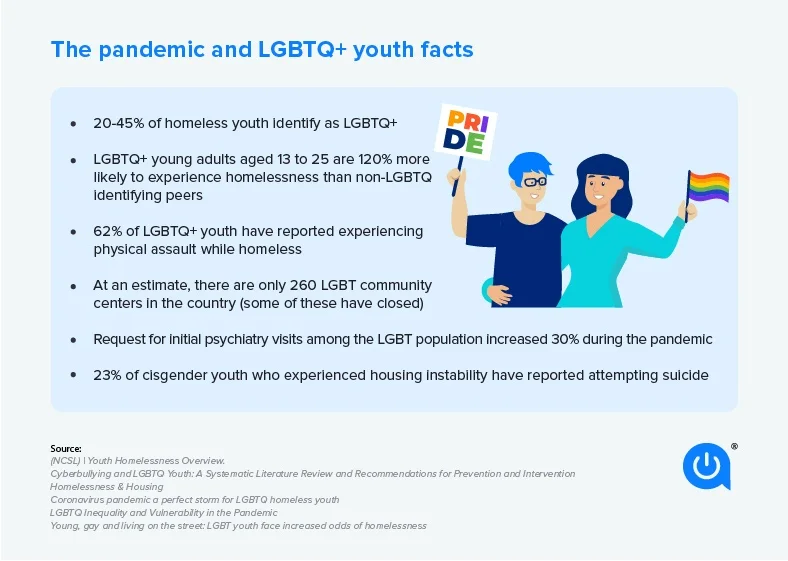
LGBTQ youth can face some unique challenges, such as higher rates of depression and suicide than their peers. A behavioral health report on youth.gov noted that suicide is the third leading cause of death among youth and young adults, and up to 33% of LGBTQ youth report having attempted suicide. LGBTQ high school students are also two to seven times more likely to commit suicide than their peers.
Along with all the pressures of growing into their own identities, they have increased risks of alcohol and drug use, bullying, peer pressure, depression, suicide attempts and high-risk sexual activities. LGBTQ youth and young adults may be kicked out of their homes, and often face homelessness.
Identifying as LGBTQ doesn’t cause depression or mental health issues. The cause is rooted within outside factors: Discrimination, family rejection, negative biases and bullying and hostile microaggressions that can lead to suicidal ideation, according to the report. When LGBTQ youth aren’t accepted for who they are, they have higher rates of stress, anxiety, depression, self-harm behaviors and other disturbances to mental health.
In addition, many LGBTQ youth are confronted with online bullying. Pre-pandemic, 32% of teens aged 14-17 spent about four hours in front of screens. As of June 2020, that number leaped to 62%, according to a Statista report.
Cyberbullying has made the internet a dangerous place for LGBTQ youth, and approximately 48.7% of LGBTQ students are victims of cyberbullying each year. This can be through private text messages or public posts on social media. Cyberbullying leads to high rates of psychological and emotional distress for LGBTQ+ youth, as well as low self-esteem, social isolation, depression and thoughts of suicide.
Other resource and advocacy groups
- The National Coalition of Anti-Violence Programs – The program offers direct services to survivors of all forms of violence and their circle of family and friends. They also work on policy and advocacy, and provide “free, holistic legal services to LGBTQ and HIV-affected survivors in all five boroughs of New York City in Family Court, Housing Court, Civil Court and with immigration matters.”
- GLAAD LGBTQ Resource List – GLAAD shares stories from the LGBTQ community and this list includes resources in politics, military, aging, legal and other sectors.
- The TrevorLifeline – Provides a national crisis intervention and suicide prevention lifeline for LGBTQ youth.
- Homelessness Help – Provides resources for homeless LGBTQ individuals in crisis, as well as provides a reporting platform for housing discrimination or violations.
- National Runaway Safeline – A hotline for youth who need someone to hear them, as well as for concerned adults.
- The LGBT National Youth Talkline – Free and confidential peer support for LGBTQ youth 25 and under.
- Trans Lifeline – Run by trans people, this lifeline provides peer support.
- National Suicide Prevention Lifeline – Free and confidential support for anyone in distress, suicide prevention and resources.
- TheRecoveryVillage.com – A free web resource that provides information about addiction, eating disorders and mental health issues.
Education Service Center Region 12 staff, educators, mental health advocates and care providers will join forces for the 18th Annual Teen Suicide Prevention Symposium from 9 a.m. to 4 p.m., Thursday, June 15 at 2101 W. Loop 340 in Waco.
ESC Region 12 and Partners Cedar Crest Residential Treatment Center and Daybreak Health want to gather educators, mental health providers and community members to learn and take action to help save the lives of challenged youth. The event will encourage awareness, intervention and prevention of teen suicide, regarded as the ‘preventable epidemic’ among Texas youth.
“This year’s event focuses on issues and trends impacting youth in many ways that educators, parents and care providers are seeing in our schools. From speakers on Pediatric Acute Onset Neuropsychiatric Syndrome (or PANS), to discussions about the US Surgeon General’s Advisory on Social Media and its Effect on Youth Mental Health, we are presenting cutting-edge topics that have a direct impact on our teens and their mental health,” said Jenipher Janek, a counseling services coordinator and lead for the Region 12 School Crisis Response Team.
The ESC Region 12 School Crisis Response Team includes ESC counselors and communication staff, school counselors and mental health advisors from the Heart of Texas Behavioral Health Network. The group coordinates grief response and provides logistical and communications support, and crisis recovery at no cost to area schools. In the last year, the team has responded to 18 calls to support educators and students affected by the loss of a student, employee or other crisis incident impacting school operations, including loss of life to suicide. Part of this work includes connecting schools to mental health providers and creating awareness about TCHATT, the Texas Child Health Access Through Telemedicine, which provides telemedicine or telehealth programs to school districts to help identify and assess the behavioral health needs of students and provide access to mental health services.
Event partners, expecting 80 attendees, hope to bring in even more educators, mental health providers, police officers, counselors and emergency services personnel. Advance registration ($45) is requested at: txr12.escworks.net/catalog/session.aspx?session_id=297715. Schools in the Counseling Services Membership may send staff at no additional fee. For more on ESC Region 12 Counseling Services and School Support, visit bit.ly/2023ESC12.
Additional event supporters include the Central Texas Regional Advisory Council, Heart of Texas Behavioral Health Network, Heart of Texas Regional Advisory Council, Heart of Texas Suicide Prevention Coalition and VOICE.
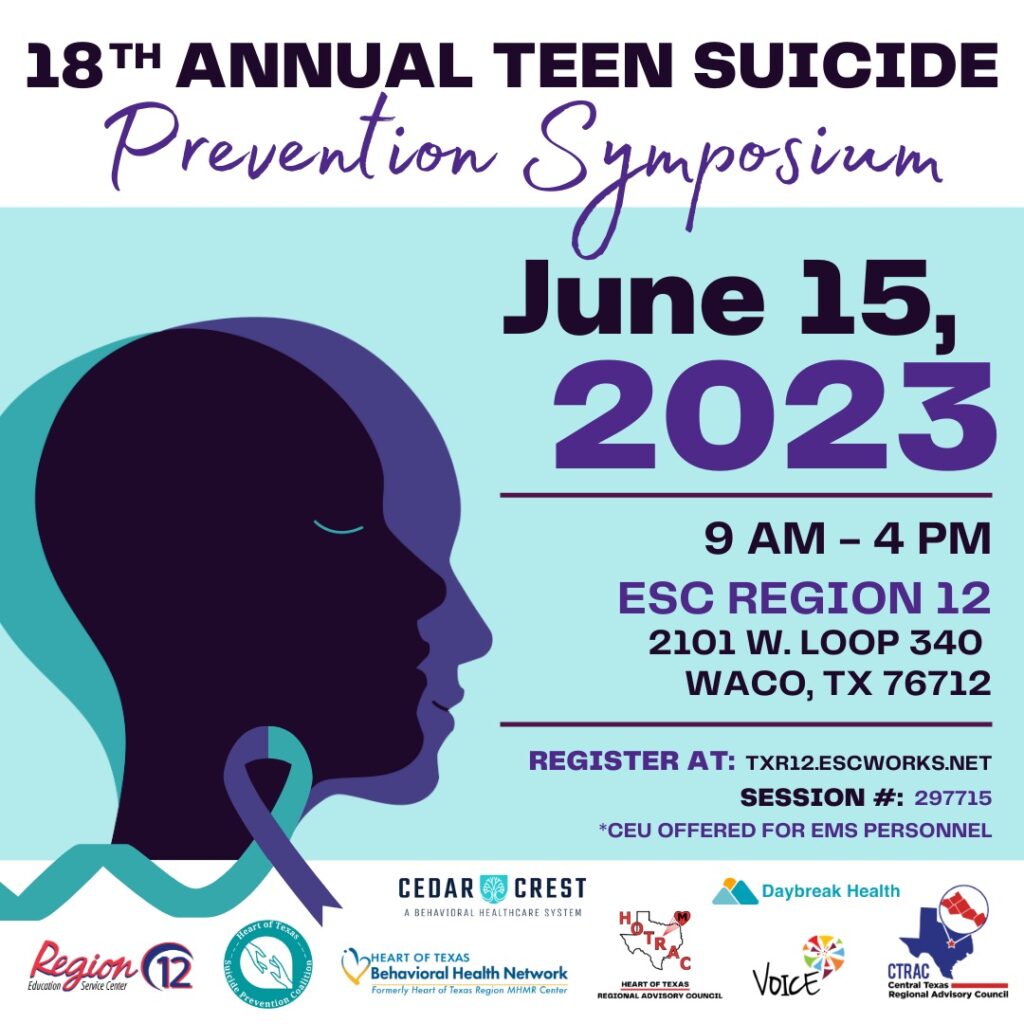
Big changes are coming for Medicaid recipients! People who are on Medicaid must take action now to preserve their benefits or find new health insurance.
Tory Schafer of Highview Insurance sat down with Meg Wallace of Mobilize Waco to explain these important changes. Meg asked Tory questions as though she were a Medicaid recipient who has been hearing about changes in Medicaid.
~~~~~~~~
Meg: I keep hearing about people getting a letter saying they need to renew their Medicaid. What is this all about?
Tory: Medicaid has income and asset limits. You have to stay within those limits to maintain eligibility in the program. The state periodically needs to review your finances to be sure you’re still eligible.
M. I’ve gotten a letter like this more than once in the past couple of years, and when I called Medicaid they said don’t worry about it. Has something changed?
T. Yes. During the pandemic millions of people lost their jobs in a short amount of time, and the government was concerned about people losing health insurance. So during the Covid Public Health Emergency, the government paused disenrollment in Medicaid. As long as the Covid Public Health Emergency lasted, people wouldn’t have to provide their financial information and recertify. They could stay on Medicaid without doing that.
The Covid Public Health Emergency is ending this spring, so Medicaid will start what is called redetermination. That means Medicaid will once again need to review your finances to see if you’re still eligible. They are starting this process now!
M. So I need to watch for this letter!
T. If you haven’t received a letter about your Medicaid recently, you need to make sure Health and Human Services has your correct address. At YourTexasBenefits.com you can see if they have your current address on file and update it if you need to.
M. OK, I’ll check on that. Then, when I get the letter about my Medicaid, what do I do next?
T. Follow the instructions in the letter to reapply for a new period of benefits. The letter should tell you what you need to submit and how to submit it.
But even if you don’t get a letter, if you receive Medicaid, you need to take care of this, and there are people in Waco who can help.
M. Oh, thank goodness, because this stuff gets confusing. Who can help me if I need help?
T. In the Waco area, Heart of Texas Goodwill and Shepherd’s Heart will have staff assigned to help people submit their information. Call Heart of Texas Goodwill at 254-753-7337 or Shepherd’s Heart at 254-213-7833.
M. Thank you. I’m writing that down now! This change is going to affect so many people. Should we be worried?
T. Yes, we should. If people don’t follow through with this process, they will lose their Medicaid benefits. So please spread the word. If you know anyone on Medicaid, let them know they must recertify this time around.
Many people will still qualify for Medicaid, but some people will find out they’re no longer eligible.
M. Yikes! Who might that happen to?
T. Four groups of people are likely to find out they’re no longer eligible.
First, adults who were briefly unemployed during the pandemic and began receiving Medicaid as a result may have income now, so they won’t be eligible for Medicaid anymore.
Second, women who received pregnancy Medicaid during the pandemic and have since given birth will no longer be eligible.
Third, young adults who were on children’s Medicaid at the start of the pandemic and who have since turned 19 are now too old for children’s Medicaid.
Fourth, children who were receiving children’s Medicaid during the pandemic because their parents’ income was lower, may become ineligible because their parents’ income is too high now.
M. Wow. That’s a lot of people. What can they do if they aren’t eligible for Medicaid anymore?
T. It depends. Some people will be eligible for other health insurance programs, and some will not. But many people don’t even try to get health insurance because they think it’s too expensive or they won’t be eligible. This is a big mistake.
If you’re eligible for employer-paid benefits, your first step is to talk to the person in charge of benefits where you work. Your special enrollment period may last only 60 days after you lose Medicaid.
If you can’t get affordable health insurance through your employer, there’s a good chance marketplace insurance will work for you. Right now, because of new federal funding, more people than ever before who have limited income are eligible for ACA insurance with premiums less than $20 per month, and with low or no deductibles or copays.
If you can’t get coverage in one of those two ways, there are also local options such as Indigent Health Care and the Waco Family Medicine Good Health Card.
M. I had no idea there were so many possibilities. Who can help me look at my options?
T. We’ve built a website called Unlock Healthcare, at www.unlockhealth.care, to provide information about these health insurance programs, along with contact information for local people who can help.
M. OK. So I think it’s going to be all right. I just need to follow through.
T. That’s right. There really are a lot of good options. But now is the time to take action.
~~~~~
Tory Schafer is the owner of Highview Insurance and the primary builder of Unlock Healthcare.
Meg Wallace is the organizer and director of Mobilize Waco, formerly known as the Amberley Collaborative. Mobilize Waco is a disability justice coalition that works toward full participation and leadership by people with disabilities in the Waco area.
Be Awesome Now and the Baylor Department of Wellness are partnering to sponsor the 2023 Fit & Well Expo 9 a.m.-2:30 p.m. Saturday, Feb. 11, at the SUB Barfield Drawing Room on the Baylor campus. The event will feature the following:

– Nutrition tips with Regina Mastin, Baylor Counseling;
– Fitness tips with Kelvin Robinson, HighPower Fitness;
– Pain-free training tips with John Weldon, D.P.T., Well Done Physical Therapy;
– Self-love tips with Emily Field, Refit Waco;
– Understanding “tripledemic” risks with Benjamin Ryan, Ph.D., Baylor Environmental Science;
– Wholeness & balance tips with Jon Singletary, Ph.D., Baylor School of Social Work; and
– Somatic yoga with Bianca Davis, East Meets West Training.
The Expo is free, and lunch will be included for the first 200 registrants. For more information and to register, click here.
By Rae Jefferson
Less than a year after publicly announcing plans to construct new headquarters, Waco Family Medicine broke ground Thursday, Oct. 20, on a new clinical site that will warmly welcome all people in the Heart of Texas regardless of income or insurance status.
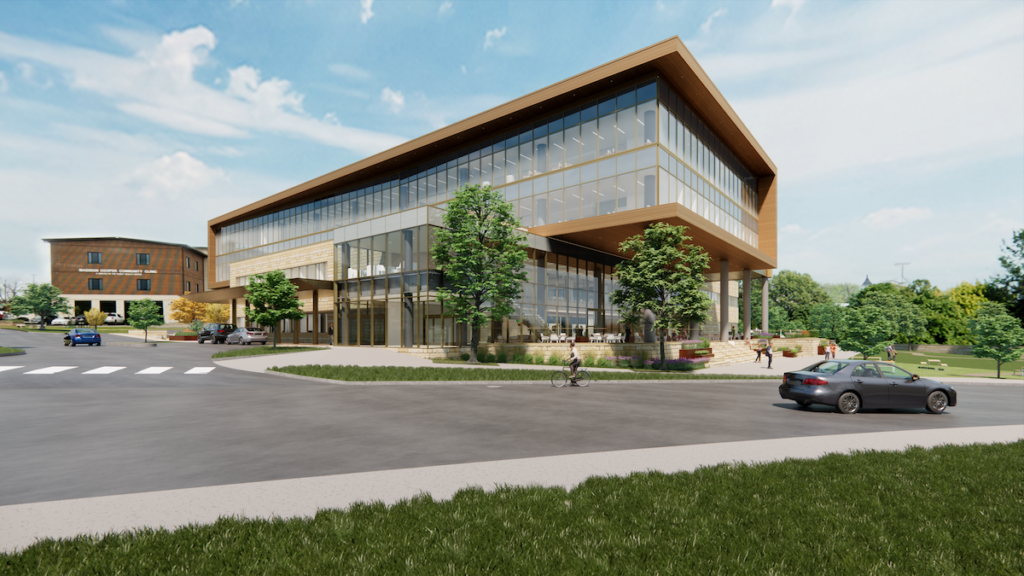
The clinic is at 1600 Providence Dr. Guests included WFM staff, local officials, community leaders, and enthusiastic benefactors who support accessible, high-quality healthcare in McLennan and Bell counties.
The speaker lineup included special guests Chip and Joanna Gaines, who are generous supporters of the campaign to fund the new site. They contributed to the project in honor of former WFM physician and faculty member Dr. Tim McCall and wife, Janice.
“Waco Family Medicine has been here to meet the needs of our community and the families here in Waco for over 50 years,” said Chip and Joanna Gaines. “We’re proud and grateful for the level of care and compassion the doctors and staff have offered and expressed during the past five decades. Thank you, Waco Family Medicine, and also a thanks to Tim and Janice McCall for all of their selfless work in serving Waco Family Medicine and, now, the children of Northern Uganda.”
More than 50 years ago, the residency program at WFM was born out of cross-sector collaboration. County officials, business leaders, and local medical providers sought to train new family physicians to alleviate a provider shortage and meet overwhelming medical need within the community. Today, the 15-site Community Health Center provides high-quality medical, dental, and mental health care to more than 60,000 patients each year. Additionally, the clinic’s family medicine residency program is in the top 2% of programs in the country, with hundreds of applicants vying for 12 openings each year.
“Multiple generations of local physicians and community members built Waco Family Medicine into an excellent center for primary care and a national academic family medicine leader,” said Dr. Jackson Griggs, CEO. “Building on that success, our new facility will inspire enduring generations of patients and health professionals and will anchor Waco Family Medicine’s efforts to achieve community thriving through whole-person, compassionate, comprehensive primary care.”
The new $61 million facility will further expand WFM’s capacity to care for patients, improve the healthcare team experience, and advance education and research in primary care. Construction will occur in phases to minimize disruptions to the adjacent WFM-Central location that the new building will eventually replace. Project completion is estimated for the summer of 2024.
Innovation is central to the blueprint of the coming site, with features like a state-of-the-art fitness center, teaching kitchen, and community garden intended to improve patient health in spaces other than an exam room. The first floor will also include a community marketplace with representatives from different social service agencies and nonprofits on site to assist patients with needs beyond healthcare.
“We are building this facility with a vision toward the future,” Griggs said. “In the decades to come, primary care will transform the American ‘sick care’ system into a true health care system, and Waco Family Medicine will be leading the way with interprofessional teams promoting wellness, integration of mental and oral health, and key services for non-medical drivers of health.”
Rae Jefferson is communications director at Waco Family Medicine, a Federally Qualified Health Center providing affordable, high-quality medical, dental, and behavioral health care in McLennan and Bell counties. She has a bachelor’s degree in Journalism and is pursuing her master’s in journalism, PR and new media at Baylor University.
By Deneece Ferrales
Feb. 7 is National Black HIV/AIDS Awareness Day. Uriah Robertson and the team at Waco-McLennan Public Health District who work in the clinic for HIV/AIDS services are preparing to use the occasion to raise HIV/AIDS awareness and encourage testing.“

Studies show that African Americans make up about 45 or 47 percent of new HIV diagnoses,” Robertson said. “Amongst women, we are seeing that African American women are 57 percent of new diagnoses. So, how do we decrease the numbers? We have to educate, advocate, encourage routine testing and so much more.”
As a risk reduction specialist, Robertson said his job is to “work with the community to provide intervention and prevention tools. We even perform HIV testing and encourage the importance of knowing your status.” Risk reduction specialists “have those conversations that others are afraid to have. We work to build rapport with our clients so we can get out into the clinic so that we can get the word out about our services while also working to break down the walls of stigma about HIV/AIDS.”
According to HIV.gov, a website managed by the U.S. Department of Health and Human Services, he first Black HIV/AIDS Awareness Day was held in 1999 as a grassroots opportunity to raise awareness in minority communities. In 2001, the day was given national status. This became needed as the number of new infections were disproportionately affecting people of color, particularly Black communities. At that point, new cases of HIV were escalating so quickly in the Black community that national leaders and the Centers for Disease Control began concerted efforts to combat the spread of HIV/AIDS in communities of color. According to the CDC, the history of these efforts includes:
- In 1998, the Congressional Black Caucus joined African American leaders from all over the U.S. to declare a “state of emergency” and created the Minority AIDS Initiative to offer funding for prevention efforts in Black communities. The CDC launched an array of prevention efforts aimed at preventing the spread of HIV among African Americans as a result of this funding.
- In 2000, HIV cases among Black and Latino men exceeded cases among White men, which was disproportionate to the general population, thus calling attention to health inequities surrounding the spread of HIV/AIDS.
- In 2007, the CDC launched its expanded HIV testing initiative to increase testing opportunities, primarily among African Americans.
- In 2008, the Black AIDS Institute reported that if Black America were its own country, it would rank 16th in the world in terms of number of people with HIV. It was estimated that 1 in 16 Black men would contract HIV/AIDS in their lifetime (approximately 6% of the population) and 1 in 32 Black women would contract HIV/AIDS in their lifetime.
- In 2010, the Obama Administration released first National HIV/AIDS strategy for the United States, which called on the nation to focus HIV prevention efforts on those at greatest risk, including African Americans.
Despite these efforts, sadly, this has not changed in the past 23 years. African Americans, more than any other race, have the highest rates of HIV infection in the nation. Black Americans account for approximately 14% of the U.S. population, but nearly half of those living and dying with HIV and AIDS are Black. Within this population, gay and bisexual men are the most affected, followed by heterosexual women. AIDS is the third leading cause of death among Black women aged 25–34 and 35– 44 and among Black men aged 35–44 (CDC).
Not only does this health inequity appear in the number of African Americans contracting HIV/AIDS, it also appears in the treatment of HIV/AIDS. Compared to all other persons with HIV, African Americans had the lowest rates of viral suppression. According to the CDC, out of every 100 Black persons living with HIV, only 63 are receiving some type of HIV care, 48 of 100 were retained in HIV care, and 51 of 100 were virally suppressed. This means that little more than half of all African Americans living with HIV received any type of treatment.
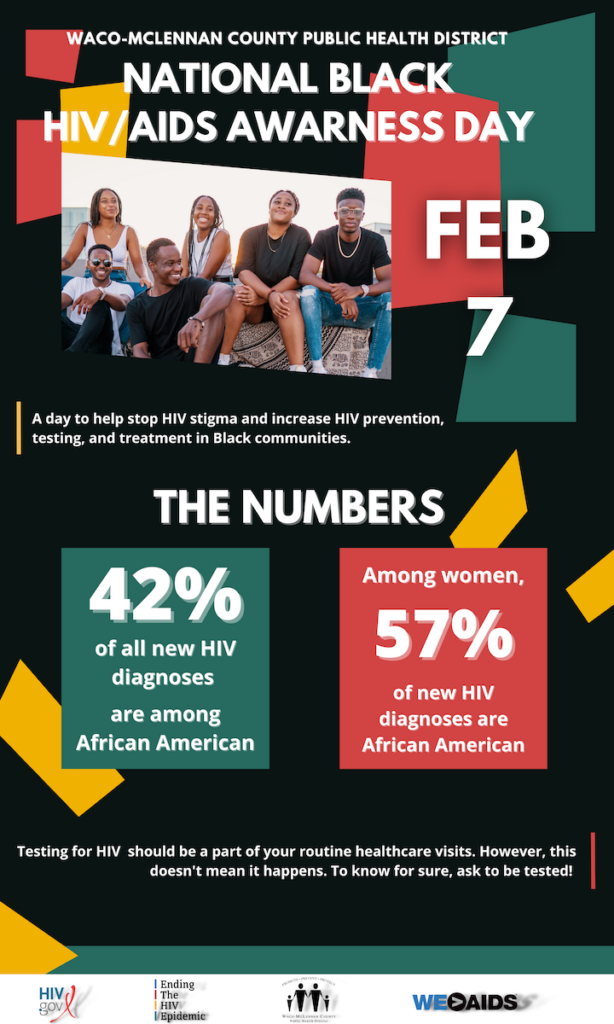
Though HIV is preventable, prevention remains the biggest challenge and further calls attention to the health inequities around this disease in Black communities. The challenges to prevention efforts include the stigma of a positive HIV status, people not having awareness of their HIV status, homophobia, racism, and mistrust of the healthcare system.
Lack of awareness of one’s HIV status can also lead to poor HIV treatment outcomes. Further, STI rates among African Americans are higher than among any other minority group, and there is a link between being diagnosed with other Sexually Transmitted Infections (STIs) and contracting HIV.
Lastly, persons experiencing poverty, which is higher in Black communities, are less likely to have access to quality healthcare for HIV, stable housing, and HIV prevention services.
So where do we start in addressing this health inequity? The most important place to begin is to encourage testing. If HIV is left untreated, chronic illness and death are the likely outcomes.
The first step to preventing this is for a person to know his or her status. Knowing one’s status can also prevent the further spread of HIV. Health professionals must continue to partner with Black community leaders to make outreach efforts aimed at more testing and increased awareness of prevention.
HIV treatment and prevention has come a long way in the past three decades. On Feb. 7, it is important to increase awareness of the continued need to address HIV prevention and treatment, particularly in Black communities. This is also a great day to encourage testing and the importance of knowing your status. Together, we can continue that fight to eradicate HIV/AIDS.

Deneece Ferrales, Ph.D., is director of health initiatives for Prosper Waco.
The Act Locally Waco blog publishes posts with a connection to these aspirations for Waco. If you are interested in writing for the Act Locally Waco Blog, please email the ALW team — [email protected].

